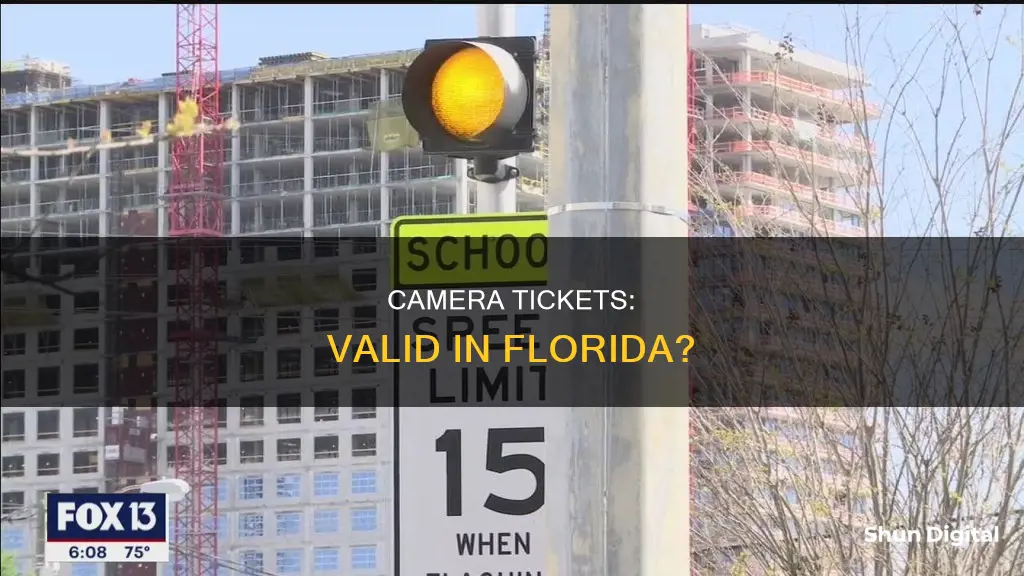
Florida's red light cameras are legal and have been implemented to enhance road safety and reduce accidents at intersections. These cameras are typically placed at busy intersections and capture photo or video evidence of potential traffic violations. If a vehicle enters an intersection after the traffic light turns red, the camera system is triggered, and the registered owner of the vehicle receives a ticket in the mail. The cost of a red light camera ticket in Florida is typically $158, but failure to pay the fine on time can result in increased fines, court costs, and points added to the driving record. While most people choose to pay the fine, it is possible to contest a red light camera ticket in court, especially if there are valid reasons for running the red light.
| Characteristics | Values |
|---|---|
| Legality of camera tickets in Florida | Legal |
| Number of active red light cameras in Florida | 485 |
| Number of notices of violation issued in FY 2021-2022 | 1 million+ |
| Cost of a red light camera ticket | $158 |
| Cost of ticket if unpaid after first notice | $262 |
| Time to pay ticket or contest violation | 30 days |
| Possible defenses against ticket | Not a clear photo, camera malfunction, avoiding an accident, faulty brakes |
What You'll Learn

What is a camera ticket?
A camera ticket, also known as a red light ticket, is a traffic citation issued when a camera system set up at an intersection captures a photo or video of a vehicle that has entered the intersection once the traffic lights turn red. These camera systems are typically installed at busy intersections and are attached to poles at each corner, with clear visibility to drivers. They are triggered by sensor points in the road that detect the weight of a vehicle.
When a vehicle drives over the sensor point after the light has turned red, the camera captures two photos—one of the driver and one of the license plate. The license plate number is used to identify the vehicle owner, who is then mailed the ticket. In some states, the driver of the vehicle is responsible for the violation, while in others, it is the owner of the vehicle.
In Florida, red light camera tickets typically cost $158 per offense, or $262 if payment is not made after the initial notification. It is important to note that ignoring a red light ticket can lead to further complications, such as a suspended license, excessive fines, and additional fees to reinstate the driver's license.
The Evolution of Photography: First Camera's Birth
You may want to see also

Are red light cameras legal in Florida?
Red light cameras are legal in Florida. The Florida Supreme Court ruled in 2019 that red light cameras are legal and can be used in the interest of public safety. This ruling affirmed the legality of red light cameras, which are automated systems that capture photo or video evidence of vehicles running red lights at road intersections.
The use of red light cameras in Florida is somewhat controversial. While some local governments have adopted their use to improve road safety and reduce accidents, other cities and counties have chosen not to implement them. As of June 30, 2021, Florida had 485 active red light cameras, which issued over 1 million notices of violation in FY 2021-2022.
The legality of red light cameras in Florida has been questioned, with critics arguing that they can cause more accidents as drivers may stop abruptly to avoid a ticket. Additionally, there have been concerns over the shortening of yellow lights, making it easier for drivers to receive a red light ticket. In response to these concerns, Florida passed a law allowing citizens to request an administrative hearing to challenge a red light camera ticket within 60 days of issuance.
If you receive a red light camera ticket in Florida, it is important to take it seriously. The standard fine for a red light camera violation in Florida is $158, but this can increase to $262 if not paid promptly. Failure to pay the fine can result in additional consequences, including court fees, points on your driver's license, and even a suspended license.
To avoid a red light camera ticket, ensure that you come to a complete stop before turning right at a red light and always obey traffic signals. Remember, red light cameras are there to improve road safety and reduce accidents.
Finding the Remaining Battery Life on Your Canon SX10 IS
You may want to see also

What happens if you get a red light ticket?
Red light cameras are legal in Florida, and the state has issued over 1 million notices of violation in the past couple of years. So, what happens if you get a red light ticket?
Firstly, it's important to know that you can be issued a red light ticket even if you are turning right. This is because, in Florida, you must come to a complete stop before turning right on a red light. If you fail to do so, you can be issued a ticket.
If you are issued a red light ticket, you will receive a notice of violation in the mail. This first notice will not add any points to your driver's license, but it is still important to pay the fine of $158 within 30 days. If you fail to pay the fine after the first notice, the price will increase to $262, and points will be added to your license.
There are several ways to respond to a red light ticket:
- Pay the fine: You can pay the fine by phone, mail, or online.
- Elect a Driver Improvement Course: By enrolling in a basic driver improvement course, you may receive an 18% reduction in the citation fee. However, you must enrol within 30 days of receiving the citation.
- Contest the citation: If you believe you were incorrectly issued the ticket, you can dispute it. For example, if you weren't the person driving the car, you can fill out an affidavit form.
It's important to note that ignoring a red light ticket can lead to serious consequences, including a suspended license, excessive fines, and fees to reinstate your driver's license. Therefore, it's best to take swift action once you become aware of the ticket.
Y Dome Camera: Battery-Powered Security Solution?
You may want to see also

How much does a red light camera ticket cost?
Red light cameras are legal in Florida, and they are used to enforce traffic laws and improve road safety. If you are caught running a red light by one of these cameras, you will receive a ticket, also known as a citation. The standard cost of a red light camera ticket in Florida is $158 per offense. However, if you fail to pay the fine after the initial notification, the cost may increase to $262. It's important to note that there might be slight differences in the cost from county to county.
In Florida, the vehicle owner is held responsible for the red light camera citation, even if they were not the one driving. The ticket is typically mailed to the owner's address, and it's important to pay the fine or contest the ticket within the given timeframe. Failure to address the ticket can lead to additional penalties, such as a suspended license, higher fines, and court fees.
While the cost of a red light camera ticket in Florida is typically $158, the overall cost of the violation can vary depending on your driving record and the specific location of the red light. In some cases, your auto insurance company may increase your insurance rates after receiving a red light citation. Additionally, if you have a history of traffic violations, you could face a higher fine.
It's worth noting that running a red light in California comes with a much higher fine of $500, and in Ontario, the fine for a red light camera ticket is $325.
Olympus Camera Battery Encoding: What's the Deal?
You may want to see also

What should you do if you get a red light ticket?
Red light cameras are legal in Florida, and the state has 485 active red light cameras. If you get a red light ticket, you should not ignore it. Here are the steps you should take:
Understand the Ticket
When you receive a red light ticket in the mail, it will include the date, time, and intersection location of the incident, along with the cost of the violation and the due date for payment. The standard cost of a red light camera ticket in Florida is $158, but this can vary across counties. If you fail to pay the ticket after the first notice of violation, the fine may increase to $262.
Contact a Lawyer
You should not immediately pay the fine. Instead, it is advisable to speak with a Florida traffic ticket lawyer, especially if you received a second notice of violation. A lawyer can help you understand your options for disputing the ticket and possibly getting the fine reduced or dismissed. They can also guide you through the legal process and ensure your rights are protected.
Learn About the Penalties
Red light camera tickets in Florida can result in high fines and points on your driver's license. Even if you pay the initial fine promptly, you may still face increased insurance costs and other long-term financial consequences. It is important to understand these potential penalties before deciding how to respond to the ticket.
Explore Possible Defenses
There are several possible defenses for a red light camera ticket, including unclear or insufficient photo/video evidence, faulty camera equipment, or extenuating circumstances such as avoiding an accident or having faulty brakes. A lawyer can help you determine if any of these defenses apply in your case and build a strong argument.
Be Aware of Scams
Authorities in Florida have warned about fake red light ticket scams, where people receive letters demanding payment for fictitious tickets. Be cautious of any letters that include incorrect logos, out-of-state addresses, or instructions not to contact the court. If something seems suspicious, contact the police or a lawyer for guidance.
Blackvue Cameras: Where Are They Manufactured?
You may want to see also
Frequently asked questions
Yes, red light cameras are legal in Florida.
Camera tickets are received either in-person from a law official or through the mail. The tickets are issued when a camera system set up at intersections captures a driver running a red light.
If you receive a camera ticket, you will be mailed a notice of violation along with a fine. This fine is $158 for the first notice and $262 for the second.
It is recommended that you do not ignore the ticket. You can either pay the fine, contest the citation, or take a basic driver improvement course.
You can check for a camera ticket by entering your driver's license number on the License Check website provided by the Florida DMV, calling the local courthouse, or calling American Traffic Solutions (ATS).







